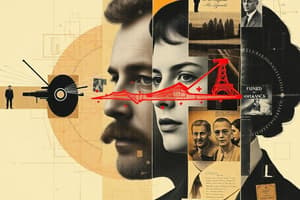Podcast
Questions and Answers
What describes the Electra Complex?
What describes the Electra Complex?
- Refusal to grow up or take responsibility
- Daughter's psychosexual competition with sister
- Daughter's psychosexual competition with mother (correct)
- Mother's psychosexual competition with daughter
The Oedipus Complex involves a son's competition with his father.
The Oedipus Complex involves a son's competition with his father.
True (A)
What is a soliloquy?
What is a soliloquy?
A character speaks thoughts aloud, alone on stage.
The Great Chain of Being represents a hierarchical structure of all _______ and _______.
The Great Chain of Being represents a hierarchical structure of all _______ and _______.
Match the literary devices with their definitions:
Match the literary devices with their definitions:
Flashcards
Tragic Hero
Tragic Hero
A character with a fatal flaw who ultimately suffers a tragic downfall.
Pathetic Fallacy
Pathetic Fallacy
The attribution of human emotions and feelings to nature or inanimate objects.
Catharsis
Catharsis
The emotional release experienced by the audience of a play or piece of art, often leading to a sense of catharsis.
Soliloquy
Soliloquy
Signup and view all the flashcards
Aside
Aside
Signup and view all the flashcards
Oedipus Complex
Oedipus Complex
Signup and view all the flashcards
Electra Complex
Electra Complex
Signup and view all the flashcards
Dehumanization
Dehumanization
Signup and view all the flashcards
Dramatic Irony
Dramatic Irony
Signup and view all the flashcards
Study Notes
Psychoanalytic Complexes
- Electra Complex: A daughter's psychosexual rivalry with her mother.
- Peter Pan Complex: Reluctance to grow up or accept responsibility.
- Heracles Complex: A heroic struggle against overwhelming challenges.
- Jocasta Complex: A mother's psychosexual rivalry with her daughter.
- Cinderella Complex: Emotional dependence on others for fulfillment.
- Oedipus Complex: A son's psychosexual rivalry with his father.
Defense Mechanisms
- Repression: Subconsciously blocking unacceptable thoughts.
- Projection: Attributing one's own feelings to others.
Social Attitudes
- Misogyny: Dislike or prejudice against women.
- Misandry: Dislike or prejudice against men.
- Sex vs. Gender: Biological differences compared to social roles.
- Dehumanization: Denying human qualities to individuals or groups.
Macbeth Study Notes
- Tragic Hero: A character with a fatal flaw leading to downfall.
- Pathetic Fallacy: Attributing human feelings to nature.
- Catharsis: Emotional release through art or drama.
- Soliloquy: A character speaking their thoughts aloud, alone on stage.
- Aside: A remark intended for the audience, unheard by others.
- Dramatic Irony: The audience knows something the characters don't.
- Nemesis: The agent causing someone's downfall or punishment.
- Great Chain of Being: A hierarchical structure of all matter and life.
The Great Gatsby Study Notes
Literary Devices
- Metaphor: Direct comparison between two unrelated things.
- Simile: Comparison using "like" or "as."
- Foreshadowing: Hints of future events.
- Allusion: Indirect reference to a person or event.
- Alliteration: Repetition of consonant sounds at the beginning of words.
- Personification: Giving human traits to non-human things.
- Imagery: Vivid descriptions appealing to the senses.
- Oxymoron: Contradictory terms used together.
- Hyperbole: Exaggerated statements not meant literally.
- Anaphora: Repetition of words at the beginning.
- Repetition: Repeated use for emphasis.
- Flashback: Past events recounted.
- Paradox: A seemingly contradictory statement that reveals truth.
Studying That Suits You
Use AI to generate personalized quizzes and flashcards to suit your learning preferences.
Description
Explore key psychoanalytic concepts including the Electra and Oedipus complexes, along with essential defense mechanisms like repression and projection. Understand how social attitudes towards gender can affect psychological theories. This quiz blends literature with psychological principles.




